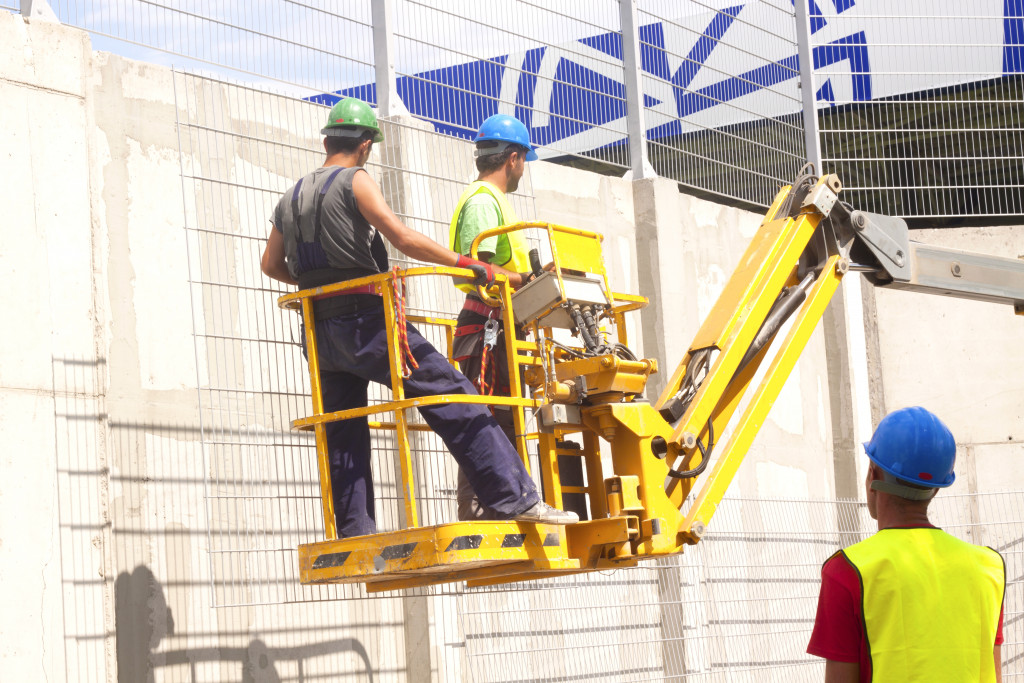Construction projects may rise and fall depending on the economy, but their demand is constant. As such, any business in the industry is profitable. You can be a general contractor specializing in building homes. You’d have a good customer base, as people don’t stop building their dream homes even during the pandemic.
You can also start a construction company, especially if you’ve already built a solid, professional network. But if you’re a young entrepreneur with limited capital, consider starting small. After all, taking baby steps is the best way to reach the top. Plus, a small business in the construction industry isn’t any less profitable. In fact, it may give greater returns since chances are you’d be targeting a specific market niche, as opposed to a diverse group.
Your startup can specialize in any of the top three construction materials: steel, wood, or concrete. Let’s find out below which one can work best for you:
1. Steel
Steel is a crucial component in the construction industry. It replaced cast iron, the type of metal once used traditionally for building structures.
Currently, there are no standard alternatives to steel, though metal composites and engineered timber are becoming popular steel substitutes for some commercial projects. The advantage of using engineered wood, in particular, is that it’s more eco-friendly. Metal composites, on the other hand, are more durable than steel.
However, both steel substitutes come at a higher price. Hence, steel remains to be the top choice for most construction projects. Bear that in mind in case you’re faced with competitors supplying those substitutes.
A steelworks business requires essential tools for metalworking. These include:
- Bandsaw
- Hacksaw
- Laser cutting or laser etching machine for stainless steel
- Plasma arc cutter
- Flux core welder
- Welding torch and other welding equipment
- Drill press
- Angle grinders
- Lathe
Training is required before using these tools for commercial purposes. If you want to engage in the labor yourself, consider completing a short course on steelworks. Practice under an experienced professional as well.
2. Wood

Wood will always be an integral part of every structure. It frames buildings, provides support, makes a valuable flooring material, and delivers a timeless aesthetic quality. Although the emergence of wood composites, 100% wood is still generally preferred.
In addition, wood is a natural resource, so producing it is more environmentally friendly. But of course, every producer of wood — whether that’s timber or lumber — should be responsible for replanting the trees they cut down. Only then will woodworking be truly sustainable.
This business is ideal for DIY enthusiasts. If you don’t specialize in framing or drywall, you can create cabinets or wooden furniture, both of which are always in demand in home-building or renovation projects. You can start with only a few basic tools, such as:
- Circular saw
- Jigsaw
- Compound meter saw
- Power drill
- Random orbital sander
- Table saw
- Router
These tools are all affordable, making your startup costs manageable. Plus, they’ll all allow you to create most wooden components of a home, such as tables, chairs, plywood, planks, and more.
3. Concrete
Concrete is crucial in making structural foundations sturdy and resilient. It’s also used for making roads, bridges, flooring, countertops, and hardscaping parts. Suffice it to say, the material is highly functional and versatile, allowing you to cater to different markets.
But if you’re starting small, consider smaller projects as well, like sidewalks, landscape curbs, slabs, driveways, or foundations. Making decorative concrete slabs is also a great idea, especially if you find a market niche that’s into industrial and utilitarian interiors. But if you’d instead work as a subcontractor, look for general contractors working on large-scale projects.
The advantage of smaller projects, though, is cheaper startup costs. You can buy bags of cement already mixed with gravel and sand. In some cases, you won’t even need laborers or masons because you can finish the project yourself. But building homes would require a team and more equipment, such as cement mixers or trucks, and protective gear.
Bonus Tip: Starting a Construction Company
If you’d instead start a construction company, be aware that this move involves more risks and paperwork. Unlike specializing in a construction material, a general construction company is all about project management. You’d oversee the construction of homes or commercial buildings and regularly meet with clients. In addition, obtaining funding may be harder since it can require higher capital and a more comprehensive business plan. So unless you’re ready for all that burden, start small with construction materials first.
Of course, it’s not exactly easy to start with steel, wood, or concrete either, but at least they allow you to focus on smaller projects. They’ll give you more time and experience to adequately prepare you for bigger and more expensive projects.

